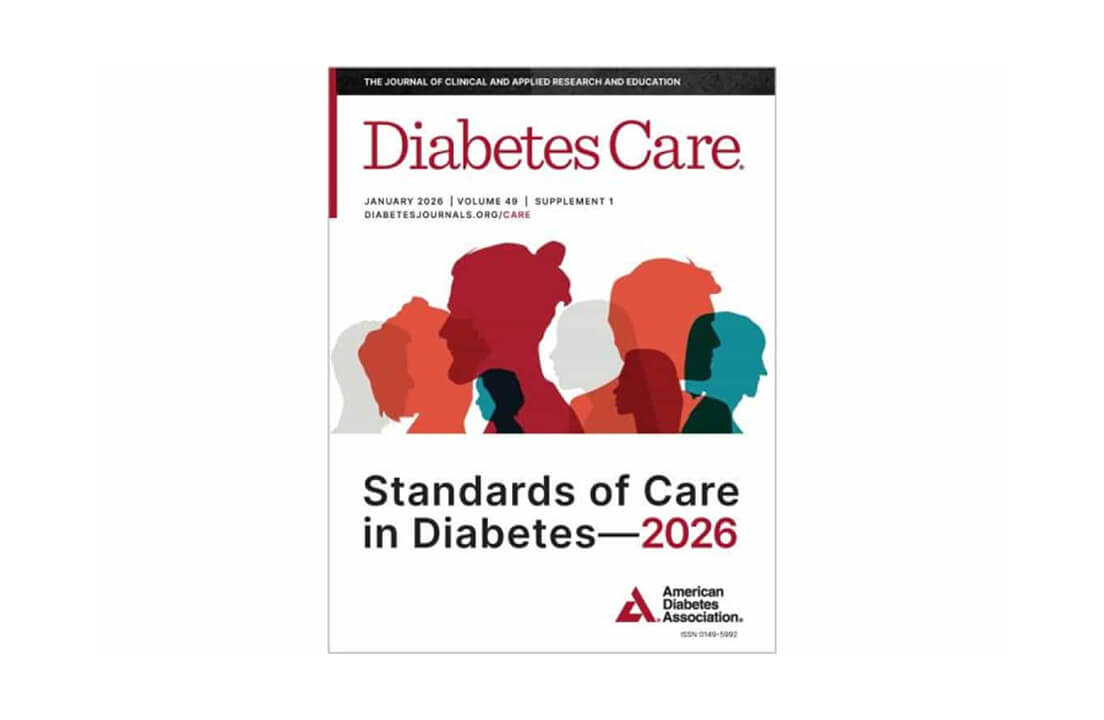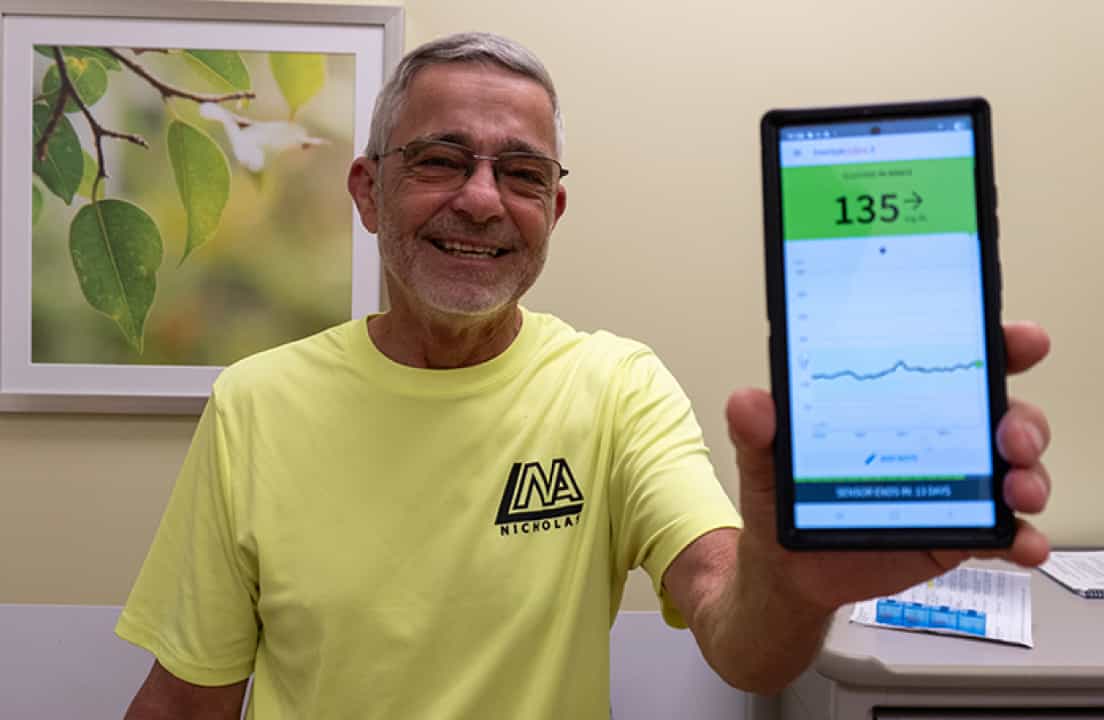T1D Guide
T1D Strong News
Personal Stories
Resources
T1D Misdiagnosis
T1D Early Detection
Research/Clinical Trials
The T1D Thyroid Disease Connection
With over 100 different autoimmune disorders, the most common ones appear to have an unfortunate link. Individuals with type 1 diabetes (T1D) are at an increased risk for developing other autoimmune illnesses such as celiac disease (CD), autoimmune gastritis (AIG), and autoimmune thyroiditis (ATD), probably the most prevalent of the three.

When you have a chronic illness like type 1 diabetes, you need to stay informed without going down a spiral of negativity. Knowing the T1D risks and correlating diseases is important, but managing stress levels and promoting your overall well-being is crucial.
It’s equally essential to know if you have a dual autoimmune diagnosis, and if you do, you’re not alone. One out of every five T1Ds suffer from additional autoimmune diseases, and between 15 to 30% of T1Ds have autoimmune thyroid diseases, such as Hashimoto’s thyroiditis or Graves’ disease.
So, What is the T1D Thyroid Disease Link?
Similar to T1D, where the antibodies attack the insulin-producing cells, with thyroiditis, the antibodies attack the thyroid. This causes the antibodies to either stimulate the thyroid (hyperthyroidism, Graves’ disease) or turn it off (hypothyroidism, Hashimoto’s disease).
The close connection may be because both affect parts of the body that produce hormones (insulin is a hormone) involved with how your body uses energy.
It’s imperative to be aware of secondary illnesses, as insulin levels can drop, and blood sugar levels can rise depending on the disorder. In the case of hypothyroidism, it can lead to bouts of low blood sugar levels.
The good news is that both thyroid disorders are easily treatable with the correct diagnosis.

Thyroid Function
The thyroid is an endocrine gland that produces hormones and regulates metabolic processes (how your body transforms food into energy). Shaped like a butterfly in the front of your neck, your doctor can sometimes feel around for abnormalities and growths. The gland also plays a role in controlling heart, muscle, and digestive function. It aids brain development and bone maintenance and releases thyroid hormones into the bloodstream. When the hormone level is low, the brain releases thyroid-stimulating hormones (TSH), which activate the gland to release more of the thyroid hormone.
Interesting Fact: Too much or too little insulin can affect thyroid hormone production and activity.
Hypothyroidism and Hashimoto’s Thyroiditis (HT)
With Hashimoto’s disease, the immune system attacks the thyroid gland, causing an underactive thyroid. This is more common with females, as women are eight times more likely to develop HT. The main difference between the two is that when the immune system attacks the gland, HT causes hypothyroidism. Hypothyroidism is simply an underactive condition with lower-than-normal levels of the thyroid-producing hormone.
Hypothyroidism Signs and Symptoms
Here are a few of the more common symptoms associated with these types of disorders:
- Weight gain
- Lethargy
- Muscle pain or weakness
- Enlarged thyroid gland or goiter
- Hoarse voice
- Menstrual irregularity
- Constipation
- Hair loss
- Dry skin
- Memory fog
- Depression
- Bradycardia (a slower-than-usual heart rate)
- Sensitivity to cold
Treatment of Hypothyroidism
Hypothyroidism should be checked regularly, and though it’s a lifelong condition, it can be easily treated with medication. Your doctor may prefer to monitor your levels through bloodwork, but if Hashimoto’s leads to full-blown hypothyroidism, you’ll need to replace the absent thyroid hormone with a supplement (levothyroxine) taken orally.
Pro Tip: While exercising is naturally beneficial with hypothyroidism, as it helps maintain healthy thyroid hormones, it’s also good to limit your soy food consumption and increase iodine-rich foods like broccoli, kale, cauliflower and brussels sprouts.
Hyperthyroidism and Graves’ Disease
Graves’ disease is an autoimmune condition that can lead to hyperthyroidism or an overactive thyroid by damaging the thyroid. With hyperthyroidism, the immune system makes more antibodies, overstimulating the thyroid cells and overproducing the thyroid hormone. Similar to Hasimoto’s, this disorder affects eight times more women than men.
Graves’ disease and hyperthyroidism are not exactly the same thing. Typical indicators of Graves’ include bulging eyes, increased energy, difficulty sleeping, diarrhea, anxiety and heat intolerance.
The symptoms of hyperthyroidism are slightly different.
Hyperthyroidism Signs and Symptoms
- Weight loss
- Anxiety, nervousness, or irritability
- Mood swings
- Sensitivity to heat
- Tachycardia (increased heart rate)
- Enlarged thyroid (goiter)
- Insomnia
- Diarrhea
- Lethargy

Treatment of Hyperthyroidism
Hyperthyroidism can be treated with antithyroid medications (methimazole and propylthiouracil), radioactive iodine orally, or by surgically removing the thyroid gland. However, the last two methods could result in hypothyroidism because they have destroyed the thyroid’s hormone-producing ability. Graves’ disease can be treated with beta-blockers and antithyroid medications.
Pro tips for living with hyperthyroidism include taking your prescribed medication at the same time every day. Also, make sure you’re getting enough calcium and protein in your diet. Lower your stress levels and avoid smoking, caffeine, and other stimulants.
Getting the Right Diagnosis
It’s vital to communicate your symptoms with your healthcare provider and request the proper screening if you feel something is not right. Routine physical exams and blood tests are imperative to maintaining a healthy lifestyle. While managing diabetes and thyroid dysfunction can be challenging, finding the right healthcare team is essential as levels constantly need adjustments.
Dual chronic illnesses can be mentally draining and contribute to further anxiety and depression, which is why you must be your biggest advocate. Self-care fosters resilience, increased energy, and a happier you.


.webp)





.webp)

.jpeg)
.jpg)

.jpg)

.jpg)
.jpg)
.jpg)

.jpg)

.jpg)

.jpg)
.jpg)



.jpg)



.jpg)




.jpg)

.jpg)



.jpg)

.jpg)




.jpg)
.jpg)
.jpg)
.jpg)
.jpg)
.jpg)
.jpg)

.jpg)
.jpg)

.jpg)



.jpg)
.jpg)
.jpg)

.jpg)

.jpg)














.jpg)


.jpg)







.webp)











.webp)










.webp)